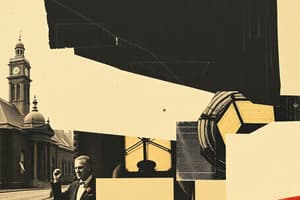Podcast
Questions and Answers
What is the primary purpose of copyright law?
What is the primary purpose of copyright law?
- To restrict public use and enjoyment of creative works
- To limit the distribution of intellectual property
- To promote plagiarism and piracy
- To establish ownership of creative works by their creators (correct)
What type of property does copyright law primarily deal with?
What type of property does copyright law primarily deal with?
- Intangible property, such as creative works (correct)
- Private property, such as jewelry and clothing
- Public property, such as parks and roads
- Tangible property, such as houses and cars
What is required to copy an entire book or a part of it?
What is required to copy an entire book or a part of it?
- A license from the government
- A fee to the book's publisher
- Permission from the author or copyright owner (correct)
- A royalty payment to the publisher
What is an exception to copyright law?
What is an exception to copyright law?
What is the consequence of performing a copyrighted song for profit without permission?
What is the consequence of performing a copyrighted song for profit without permission?
What is the definition of plagiarism?
What is the definition of plagiarism?
Before what century did most artistic works not have copyright protection?
Before what century did most artistic works not have copyright protection?
What is the term for the fee paid to performers for using copyrighted works?
What is the term for the fee paid to performers for using copyrighted works?
What is the consequence of infringing upon a copyright?
What is the consequence of infringing upon a copyright?
What is the purpose of distinguishing between different types of intellectual property?
What is the purpose of distinguishing between different types of intellectual property?
Flashcards are hidden until you start studying
Study Notes
Types of Property
- Most forms of property are concrete and tangible (e.g., houses, cars, furniture)
- Intangible forms of property include creative works (e.g., books, articles, films, software)
Copyright
- Legal protection extended to authors of creative works
- Gives ownership to creators of intellectual or artistic property
- Applies to various forms of creative works (e.g., books, magazine articles, maps, films, plays)
Ownership and Permission
- Buying a copyrighted item (e.g., magazine) grants ownership of the physical object, not the intellectual property
- Authors, publishers, or copyright holders own the research, writing, and right to reproduce copyrighted work
- Permission and likely payment are required to copy or reproduce copyrighted work
Types of Intellectual Property
- Music: can be played publicly after publication, but performances for profit require royalty payment
- Performances of songs and plays: require permission and possible royalty payment
- Names, ideas, and book titles: not copyrightable
Exemptions and Limitations
- Almost all artistic work created before the 20th century is not copyrighted (pre-dates copyright law)
- Ideas are not copyrighted until published in a tangible form (e.g., book, painting, musical work)
Infringement
- Two common ways to infringe upon copyright: plagiarism and piracy
- Plagiarism: passing off someone else's work as one's own
- Piracy: reproducing and selling copyrighted material without permission or royalty payment
Technological Impact
- Technological innovations have made piracy easier (e.g., video cassette recorders, copying software)
- Large companies actively monitor and protect their copyrights for slogans, advertisements, and brand names (trademarks)
Studying That Suits You
Use AI to generate personalized quizzes and flashcards to suit your learning preferences.




